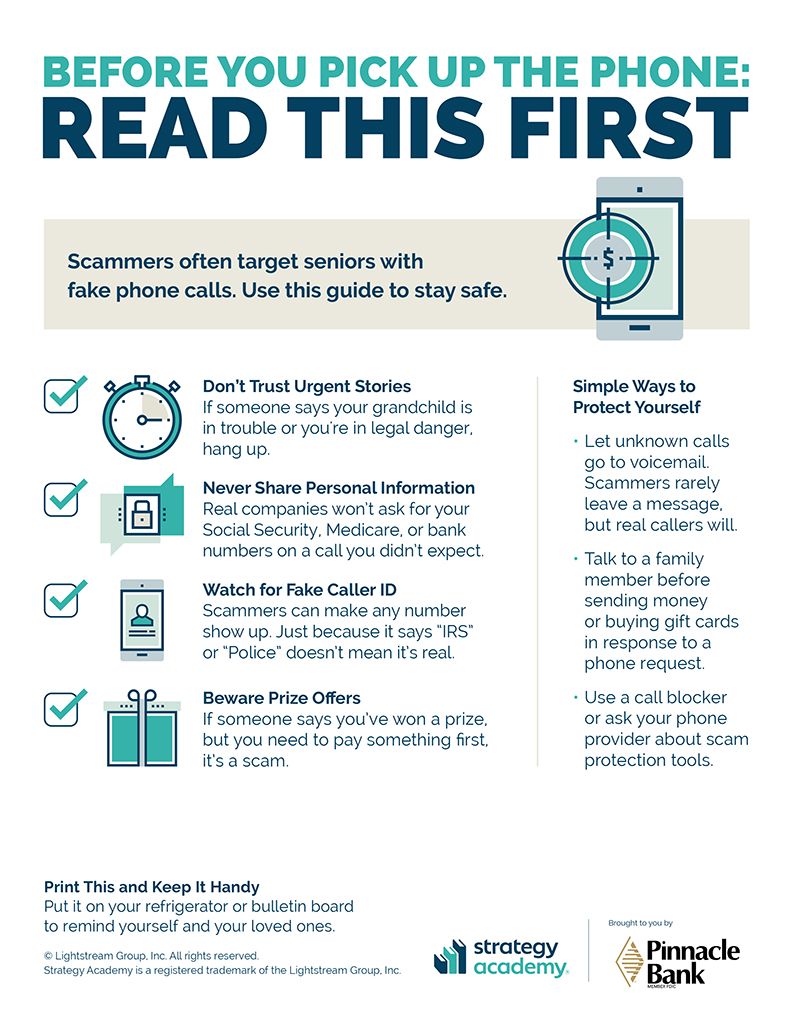The Grandparent Scam: An Alarming Family-Emergency Fraud

Year after year, imposter scams are the number one fraud reported to the FTC. In 2020 alone, Americans reportedly lost $1.2 billion to imposter scams. One particularly insidious imposter scam is known as the Grandparent Scam. This type of family-emergency scam often targets older adults posing as their grandchildren. But don’t let your guard down; these scammers could pose as anyone. We all need to be aware of this type of scam and how to spot it.
What is a Grandparent Scam?
Picture this: You’re unwinding before bed, watching your favorite TV drama, when suddenly your phone rings. On the other end is a frantic caller, “Grandma! I need your help. I’ve been in an accident and need you to send me money right away!”
It might be natural to want to help, and that’s exactly what scammers are counting on.
Here are a few common stories scammers tell:
Legal Trouble – Someone claiming to be your grandchild, a police officer or attorney calls to tell you that your loved one is in jail, and they need you to provide cash to bail them out as soon as possible.
Medical Trouble – In this scenario, the caller claims that your loved one is seriously injured or sick. Then they ask for you to send money to pay for the medical bills.
International Trouble – Your grandchild is in trouble in a foreign country, or so the caller on the other end says. While they can’t explain right now, it would be helpful if you sent them a large sum of cash immediately.
If you find yourself on one of these calls, it can seem very real. What’s worse is scammers do their best to customize the scam to specific victims. They may browse social media to learn details about your life. For instance, they may find your grandchild’s name and then use software to spoof your Caller ID, so their name appears on the screen.
What can you do?
If you receive a suspicious call:
Take your time – Scammers want you to rush, and they will upset you to impair your thinking. Give yourself space to think about their story and request – tell them you will call back and hang up.
Verify the facts – After you hang up, think about what the caller told you on the phone, does it make sense? If it seems plausible, call your loved one directly at a number you have for them. Don’t call any numbers provided by the person who called you. With any luck, your loved one will answer. If you are unable to reach them, call family members and friends who might know something (even if the caller told you not to).
If the caller claims to be from a business, organization or law enforcement, look them up online. Then call them directly using the number provided on their website and ask if they called you.
Think twice before providing money – If you didn’t initiate the call, you don’t know who’s on the other end. No matter how convincing the story, it is best to not send any money at all. Remember it’s most certainly a scam if they ask you to wire money or buy gift cards. But be wary of other payment methods too. Scammers may tell you to mail a cashier’s check or money order. Or use a digital service like peer-to-peer payment apps or cryptocurrency. Some even stop at people’s homes to pick up cash.
Take these proactive steps:
Safeguard your social media – Tighten up your privacy settings so only people you permit can see what you’re posting. Also, be aware of what you post, it’s best to keep personal and sensitive information off social media.
Don’t Interact– If you don’t recognize the number on the caller ID, ignore it. If it’s important, they can leave a message. If you do answer, end the call immediately. Do not speak with the caller. This also goes for unexpected emails and people coming to your door as well. You are not obligated to interact with them.
Share resources with friends and family – Awareness is extremely important in preventing fraud. The more people know about these scammers and their tactics, the less likely they are to fall for them.
If you have been a victim of an imposter scam, report the incident to law enforcement immediately.
After you do that, here are several other places you can make a report:
- Federal Trade Commission at ReportFraud.ftc.gov
- FBI’s Internet Crime Complaint Center at ic3.gov for frauds conducted over the internet.
- AARP Fraud Watch Network Helpline at 877-908-3360
